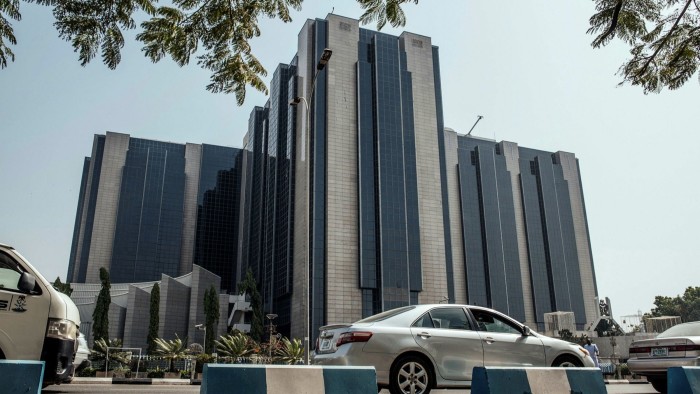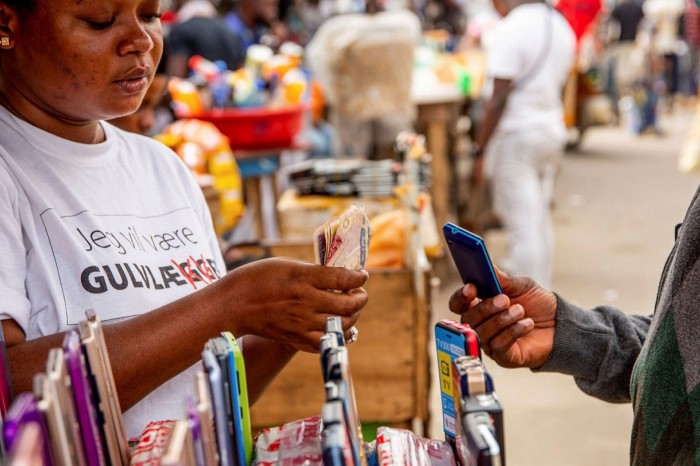Nigerian banks tap pent-up demand for retail services

Roula Khalaf, Editor of the FT, selects her favourite stories in this weekly newsletter.
While the coronavirus pandemic and falls in the price of oil have pushed Nigeria into recession twice in the past six years, the country’s financial services companies have expanded at breakneck speed.
Overall, Africa’s largest economy is home to 20 of the fastest growing companies of any kind in the inaugural FT ranking, compiled with research company Statista. That puts it second only to South Africa, which has 24 listed.
Among these Nigerian companies are specialists in agricultural commodities, construction and food. But it is those offering financial services — from fintech to asset management and insurance — that dominate, making up more than a quarter of the country’s entries.
According to Mahin Dissanayake, head of African banks at rating agency Fitch, that is because Nigeria’s “awful” economic data does not capture the activity taking place “below the radar”, and the transactions that people are still making. However, the country’s financial sector has been able to harness technology to turn these people into customers, he says.
“Africa offers a huge unbanked and underbanked market for financial services companies,” Dissanayake explains. “It offers both incumbent and new entrants opportunities to grow very fast.”
Nigeria’s 200mn population has enabled huge growth to be achieved simply by focusing on the local market. Dissanayake says the main shift has been Nigerian banks’ expansion into retail banking. Previously, they avoided retail customers as creditworthiness could not be established easily. Now, technology has made it easier to track behaviour. So banks are offering more services, such as insurance and remittances.
Data from Enhancing Financial Innovation and Access (EFInA), a research body that monitors financial inclusion in Nigeria, show that 45 per cent of adults used bank services in 2020, up from 38 per cent in 2016.
Some of the growth has been driven by efforts to cater to young people in a country that has a median age of 18, says Tunde Leye, a partner at Lagos-based intelligence consultancy SBM.
More from this report
“There was a gap in terms of what the formal financial sector provides, and what most of the people that are coming into the working class economy require,” he says. Now, a new generation of fintech entrepreneurs and bank executives wants to create services for its peers.
United Capital, a Lagos lender founded more than 50 years ago, has benefited from targeting retail customers, says Ejikeme Okoli, its head of strategy and innovation. In 2019, the company — which has subsidiaries offering investment banking, stockbroking and wealth management — set up a consumer finance business to provide microloans. Okoli says it has over 250,000 customers, with applications processed on an app.
The company has also applied for a digital banking licence to offer services such as payments and deposit taking. In its 2021 annual report, it said: “As part of our evolving corporate strategy, there is an increasing focus on the mass retail and underserved segment of the economy.”
Global Accelerex, ranked 34th in the FT-Statista list, provides electronic payment technology to businesses and government agencies seeking to process transactions. It has expanded by providing new ways of making transactions which Shalewa Alonge, head of brand and partnerships, says have grown in volume by 55 per cent in the past five years.
The company can capture payments through card machines and agency banking, and digitally via QR codes and USSD (a communications protocol for exchanging data).

Alonge says Nigeria’s central bank has helped to drive inclusion and foster growth in financial services over the past decade through policies that created an industry-wide standard for customer identification, easing concerns about electronic fraud.
In 2012, it launched an identity scheme for bank account holders, under which each is assigned a ‘bank verification number’. Each BVN is backed by biometric information to ensure that transactions can be traced. In that same year, the central bank also piloted a “cashless policy” in Lagos, under which handling charges were placed on daily cash withdrawals to make digital transactions more attractive. The policy, which imposed charges on withdrawals over NGN500,000 ($1,200) for individuals and NGN3mn for corporate bodies, went nationwide in 2014.
Ongoing investment in Nigeria suggests the trends that have propelled growth in financial services look set to continue. The country attracted the bulk of Africa’s venture capital deal volume and value in 2021, according to a report by the African Private Equity and Venture Capital Association, published in April 2022.
“The engine for Nigeria’s rapid escalation to the top spot in Africa’s start-up ecosystem lies largely in fintech,” it said. “Deals in the financials sector dominate Nigeria’s investment history, accounting for 38 per cent of deal volume in the country between 2014 and 2021.”
More growth for fintechs seems likely as a result of the pandemic. Analysts note that banks expanded their digital services as branches shut during lockdowns — but this will not be reflected in the inaugural FT-Statista ranking as it is based on revenues from 2017 to 2020
“The biggest change in retail banking happened due to the pandemic,” says Dissanayake of Fitch. “Now, all banks are deploying technology to grow in retail.”
Comments